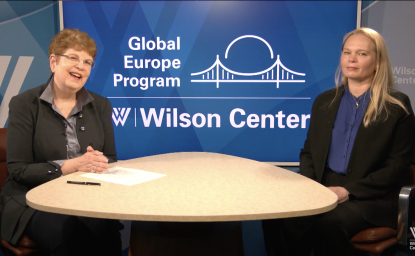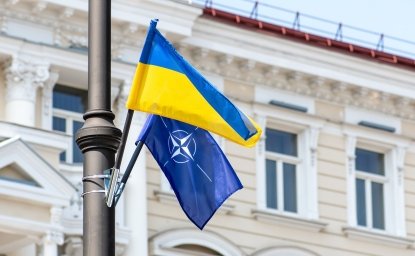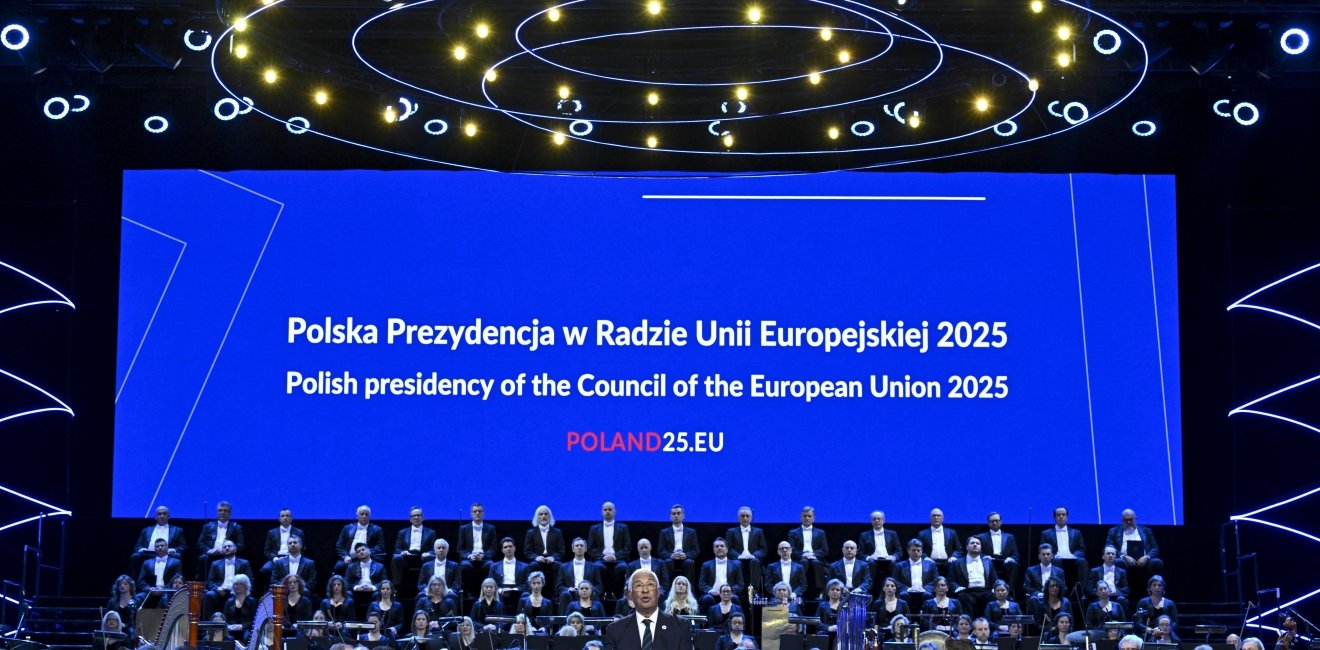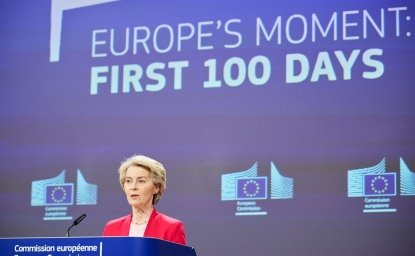The Polish presidency of the Council of the European Union, which started on January 1, 2025, has been highly anticipated. Not only because it follows the Hungarian Presidency, during which Prime Minister Orban tested the limits of this role by, among other things, visiting Vladimir Putin in Moscow. It also coincides with the start of the new European Commission, for which President Ursula von der Leyen has put forth a highly ambitious 100 day legislative agenda to revamp the EU’s security and competitiveness.
Yet, these are challenging times for Europe. Russia continues to wage war in Ukraine, a trade war looms as the new US administration takes hold, disinformation and interference threaten election integrity, and hybrid attacks continue targeting critical infrastructure. Poland’s task for the next six months is formidable: advance the necessary reforms for a secure and competitive Europe, while keeping its members united.
From a Problem Child to a Power Broker
A few years ago, a presidency transition from Hungary to Poland would not be considered much of an agenda shift. Poland, like Hungary, had been under scrutiny for concerns over its deteriorating rule of law. Since 2015, the Law and Justice party has adopted controversial reforms impacting judicial and public media independence. The Polish government at the time also frequently voted against more EU integration, pushing instead for more national sovereignty. This was most prominently on display when the Polish constitutional court’s decision challenged the primacy of EU law, a principle each member state subscribes to when joining the Union.
The Russian invasion of Ukraine in 2022 brought a seismic change to Poland’s engagement on the EU stage. It became arguably the most crucial ally of Ukraine pushing for coordinated EU support. However, significant change came with the parliamentary elections in 2023 and a new coalition government led by Donald Tusk of the liberal, pro-european Civic Platform party. Having served as the President of the European Council from 2014 to 2019, he has promised to rebuild Poland’s constructive role in Euro-Atlantic structures. While this is easier said than done, there have been calls for Poland to fill the EU leadership gap, as the Franco-German engine struggles under domestic political challenges.
"Security, Europe!”
Poland’s EU Presidency priorities are all under the umbrella of security. The country has been one of the most directly affected EU members by Russian aggression in Ukraine, it has the largest military budget in the EU at 4.12% of GDP, and has continued to deal with hybrid attacks, such as the instrumentalization of migrants at its border with Belarus. The multiple dimensions—external, internal, information, economic, energy, food and health—are, therefore, hardly a surprise and reflect the country’s threat perception as well as address broader geopolitical tensions with Russia.
Hard security and defense readiness will continue to be at the front and center of EU policy discussion. Poland has an excellent opportunity to advance European defense capabilities, first and foremost by concluding negotiations on the European Defence Investment Program (EDIP). The new Commissioner for Defense, Andreas Kobilius, is also expected to present the White Paper on the future of European defense, which will outline further initiatives for building up EU's defense industry. However, the Polish Presidency’s broader conceptualization of security will–in line with the Letta, Draghi and Niinistö reports–address other dimensions as well.
Poland’s task for the next six months is formidable: advance the necessary reforms for a secure and competitive Europe, while keeping its members united.
On economic security and competitiveness, the European Commission is expected to present the Clean Industrial Deal. This is a highly awaited strategic plan as a follow up to the European Green Deal. It aims to address the competitiveness concerns (blamed on decarbonization and expensive energy) of some of Europe’s strategic sectors, such as steel and aluminum, while ensuring it stays on track with its climate goals. The pressure to move this deal forward is high, as EU member states and business are placing high hopes on the deal to help Europe catch-up in the global competition race.
Energy security is also high on the presidency’s agenda. One ambitious, yet non-binding, goal is for Europe to completely decouple from Russian energy by 2027. However, this is a considerable challenge, considering that three years after the Russian invasion of Ukraine the EU remains the fourth largest buyer of Russian fossil fuels. Mario Draghi’s report on EU competitiveness emphasized that securing reliable and affordable energy sources is key for a globally competitive Europe. The Polish Presidency faces a complex task of finding agreement on how to achieve this, including navigating resistance from pro-Kremlin governments in Slovakia and Hungary.
The recent first round of Presidential elections in Romania has once again shown EU members are not immune to the effects of foreign interference and disinformation. The unprecedented annulment of the results spurred controversy among Romanians, undermining the credibility of democratic processes—Russia’s goal. With important elections coming up in February for Germany, potential elections in France, as well as Poland having its own presidential elections in May, the Polish presidency aims to address this elephant in the room. Capacity building, including joint EU efforts, is crucial to increase electoral resilience and prevent any similar shake-ups to EU’s stability.
While not explicitly mentioned, the Polish Presidency is also committed to move forward the enlargement process. Unsurprisingly, the primary focus will be on Ukraine, despite Poland itself having a rather complicated relationship when it comes to integrating the country into the EU’s agricultural sector. However, the Western Balkans countries must not get sidelined. Delivering on the promising timelines for Montenegro and Albania to close all negotiating chapters by 2026 and 2027, for example, would significantly boost the credibility of enlargement policy and the EU’s role in ensuring stability in the region.
Advancing reforms in candidate countries is, however, only half of the equation. The Polish Presidency will also need to start making progress for the EU to be enlargement ready. For this, the presidency should use the momentum of the Commission’s pre-enlargement reforms and policy reviews expected in early 2025.
What about transatlantic relations?
The Polish Presidency has put strengthening transatlantic ties at the forefront of its program. The potential imposition of trade tariffs, a swift end to the war in Ukraine, and a broader US disengagement from European security loom large over the future of transatlantic relations. While the Lisbon Treaty transferred much of the presidency's foreign affairs role to the High Representative for Foreign Affairs and Security Policy, Poland’s leadership in these transition times could prove beneficial. Its track record of increased defense spending—projected to reach 5% of GDP in 2025—and its ambitious presidency agenda to bolster European defense, position Poland as a credible spokesperson for Europe’s efforts to share the security burden fairly, a perennial concern for US administrations.
The potential imposition of trade tariffs, a swift end to the war in Ukraine, and a broader US disengagement from European security loom large over the future of transatlantic relations.
However, a growing transatlantic divide will undoubtedly test Europe’s unity. The EU’s ability to tackle challenges jointly has been paramount to its success. However, potential trade disputes, differing China policies, and varying responses to global crises risk exacerbating Europe’s internal disagreements on how to navigate these challenges. Case in point is continued support for Ukraine, with leaders like Hungary’s Viktor Orbán and Slovakia’s Robert Fico openly challenging the EU consensus. While it remains to be seen what lies ahead for the transatlantic relationship under the new US administration, Poland’s task is to ensure the EU remains a united front on critical issues at hand.
Road Ahead
From boosting the EU's competitiveness, to ensuring energy security, to navigating geopolitical tensions, the Polish EU Council Presidency faces no shortage of challenges. However, with its holistic approach to security, it is well-positioned to advance the objectives outlined in the Strategic Agenda 2024–2029. As the first presidency of the new EU legislative term, Poland will lay the groundwork for many key initiatives, though it will be up to future presidencies to carry them forward. The New Year's speech by Danish Prime Minister Mette Frederiksen, who will take over the EU Council presidency from Poland on July 1, underscores Denmark's commitment to continuing Poland’s work and offers a promising outlook for Europe’s ability to tackle the challenges ahead.
Author


Global Europe Program
The Global Europe Program is focused on Europe’s capabilities, and how it engages on critical global issues. We investigate European approaches to critical global issues. We examine Europe’s relations with Russia and Eurasia, China and the Indo-Pacific, the Middle East and Africa. Our initiatives include “Ukraine in Europe”—an examination of what it will take to make Ukraine’s European future a reality. But we also examine the role of NATO, the European Union and the OSCE, Europe’s energy security, transatlantic trade disputes, and challenges to democracy. The Global Europe Program’s staff, scholars-in-residence, and Global Fellows participate in seminars, policy study groups, and international conferences to provide analytical recommendations to policy makers and the media. Read more

Explore More
Browse Insights & Analysis
The Growing Transatlantic “Big Tech” Rift Explained

The EU's Role in the Future of European Defense




